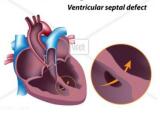Ventricular Septal Defect (VSD)
VSD

A ventricular septal defect (VSD) is a defect in the ventricular septum, the wall dividing the left and right ventricles of the heart. The extent of the opening may vary from pin size to complete absence of the ventricular septum, creating one common ventricle. The ventricular septum consists of an inferior muscular and superior membranous portion and is extensively innervated with conducting cardiomyocytes. The membranous portion, which is close to the atrioventricular node, is most commonly affected in adults and older children in the United States. It is also the type that will most commonly require surgical intervention, comprising over 80% of cases.
Organism species: Rattus norvegicus (Rat)
- Customized Service n/a Model for Ventricular Septal Defect (VSD) Disease Model Customized Service Offer
- Customized Service n/a Tissue of Ventricular Septal Defect (VSD) (If Necessary) Tissue Customized Service Offer
- Customized Service n/a Serums of Ventricular Septal Defect (VSD) (If Necessary) Serums Customized Service Offer
Organism species: Cavia (Guinea pig )
- Customized Service n/a Model for Ventricular Septal Defect (VSD) Disease Model Customized Service Offer
- Customized Service n/a Tissue of Ventricular Septal Defect (VSD) (If Necessary) Tissue Customized Service Offer
- Customized Service n/a Serums of Ventricular Septal Defect (VSD) (If Necessary) Serums Customized Service Offer
Organism species: Oryctolagus cuniculus (Rabbit)
- Customized Service n/a Model for Ventricular Septal Defect (VSD) Disease Model Customized Service Offer
- Customized Service n/a Tissue of Ventricular Septal Defect (VSD) (If Necessary) Tissue Customized Service Offer
- Customized Service n/a Serums of Ventricular Septal Defect (VSD) (If Necessary) Serums Customized Service Offer
Organism species: Canis familiaris; Canine (Dog)
- Disease model DSI600Ca01 Canine Model for Ventricular Septal Defect (VSD) In Stock
- Customized Service n/a Tissue of Ventricular Septal Defect (VSD) (If Necessary) Tissue Customized Service Offer
- Customized Service n/a Serums of Ventricular Septal Defect (VSD) (If Necessary) Serums Customized Service Offer
Organism species: Sus scrofa; Porcine (Pig)
- Disease model DSI600Po01 Porcine Model for Ventricular Septal Defect (VSD) In Stock
- Customized Service n/a Tissue of Ventricular Septal Defect (VSD) (If Necessary) Tissue Customized Service Offer
- Customized Service n/a Serums of Ventricular Septal Defect (VSD) (If Necessary) Serums Customized Service Offer


